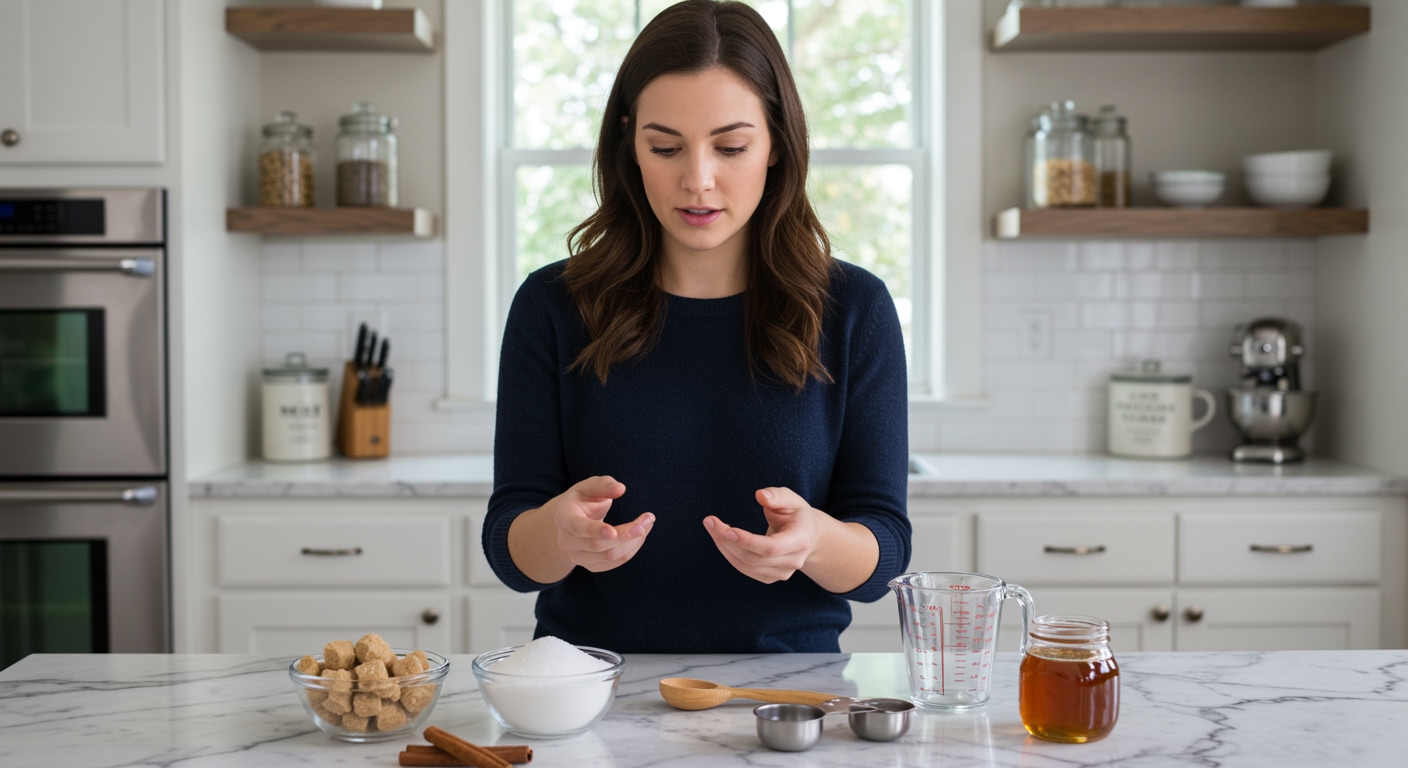✪ Key Takeaway: Brown sugar is not always bad for PCOS when consumed mindfully in small amounts as part of a balanced approach.
Introduction
You reach for that brown sugar packet at your coffee shop and suddenly feel guilty about your PCOS diagnosis.
Many women with PCOS believe that brown sugar is their enemy because they have been told that all sugars worsen insulin resistance and hormonal imbalances.
Hi, I am Abdur, your nutrition coach and today I am going to explain the real relationship between brown sugar and PCOS management.
What Makes Brown Sugar Different From White Sugar?
Brown sugar contains molasses which gives it the distinctive color and slightly different nutritional profile compared to white sugar.
The molasses provides tiny amounts of minerals like calcium, iron, and potassium that are completely absent in refined white sugar.
However, these mineral amounts are so small that they provide no meaningful nutritional benefit to your body or PCOS management.
Both brown and white sugar have nearly identical effects on your blood glucose levels and insulin response.
The glycemic index difference between brown sugar and white sugar is negligible, meaning your pancreas responds almost identically to both.
✪ Fact: Brown sugar contains 97% sucrose while white sugar contains 99.9% sucrose, making them nutritionally almost identical.
How Does Sugar Impact PCOS Symptoms?
Sugar consumption triggers your pancreas to release insulin to help cells absorb glucose from your bloodstream.
Women with PCOS often have insulin resistance, meaning their cells do not respond properly to insulin signals.
This resistance forces your pancreas to produce more insulin, creating chronically elevated insulin levels in your blood.
High insulin levels stimulate your ovaries to produce excess androgens like testosterone, worsening PCOS symptoms.
The key issue is not the type of sugar you consume, but rather the total amount and frequency of sugar intake throughout your day.
Your body processes brown sugar and white sugar through identical metabolic pathways, creating the same insulin response.
✪ Pro Tip: Focus on total sugar intake rather than worrying about brown versus white sugar when managing PCOS.
When Can Brown Sugar Be Part Of A PCOS Diet?
Small amounts of brown sugar can fit into a well-planned PCOS diet when consumed as part of balanced meals.
Pairing brown sugar with protein and healthy fats helps slow down glucose absorption and reduces insulin spikes.
Using brown sugar in homemade baked goods allows you to control the total amount and combine it with fiber-rich ingredients.
Timing matters too – consuming small amounts of brown sugar after physical activity helps your muscles use glucose more efficiently.
The portion size becomes critical, with one teaspoon containing about 4 grams of sugar that your body can handle better than larger amounts.
Complete elimination of all sugars often leads to intense cravings and binge eating episodes that worsen PCOS symptoms long-term.
✪ Note: One teaspoon of brown sugar contains only 16 calories and can satisfy sweet cravings without derailing your PCOS management.
What Are Better Sweetener Options For PCOS?
Stevia and monk fruit provide sweetness without affecting blood glucose levels or insulin response in women with PCOS.
Fresh fruits like berries offer natural sweetness along with antioxidants and fiber that support overall PCOS management.
Cinnamon can enhance sweetness perception while potentially improving insulin sensitivity in some women with PCOS.
Small amounts of raw honey provide trace minerals and may have less impact on blood sugar than processed sugars when used sparingly.
The goal is finding sustainable sweetening strategies that you can maintain long-term without feeling deprived or triggering cravings.
✪ Pro Tip: Gradually reduce sweetener amounts over time to retrain your taste buds and reduce sugar cravings naturally.
The Bottom Line
Brown sugar is not inherently worse or better than white sugar for women with PCOS, as both affect insulin levels similarly.
Moderation and mindful consumption matter more than the specific type of sugar you choose.
I would love to hear about your experiences with different sweeteners and how they affect your PCOS symptoms, so please share your thoughts in the comments below.
References
At NutritionCrown, we use quality and credible sources to ensure our content is accurate and trustworthy. Below are the sources referenced in writing this article:
- PMC: Dietary sugars and PCOS
- PMC: Sugar intake and metabolic health
- PCOS Nutrition: Sugar and PCOS management
- PMC: Insulin resistance and dietary factors





